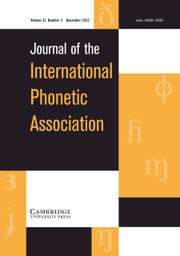Article contents
Long and short [æ] in one Southern British speaker's English
Published online by Cambridge University Press: 06 February 2009
Extract
1. Several of the standard works on English pronunciation speak of exceptional cases of lengthening of ‘short’ vowels, and of [æ] in particular:
‘In the South of England a fully long æː is generally used in the adjectives ending in -ad (bad bæːd, sad sæːd, etc.), and is quite common in some nouns, e.g. man mæːn or mæn, bag bæːg or bæg, jam dʒæːm or dʒæm. … the words back, that (meaning ‘that thing’) at the end of a sentence are often pronounced with long æː by some Southern English people.’ (Jones 1960: 235.) ‘This traditionally short vowel appears to be lengthened in RP especially before the lenis consonants /b, d, g, dʒ, m, n/ (cab, bad, bag, badge, jam, man).’ (Gimson 1962: 100.)
- Type
- Articles
- Information
- Journal of the International Phonetic Association , Volume 7 , Issue 2 , December 1977 , pp. 55 - 65
- Copyright
- Copyright © Journal of the International Phonetic Association 1977
References
- 7
- Cited by


